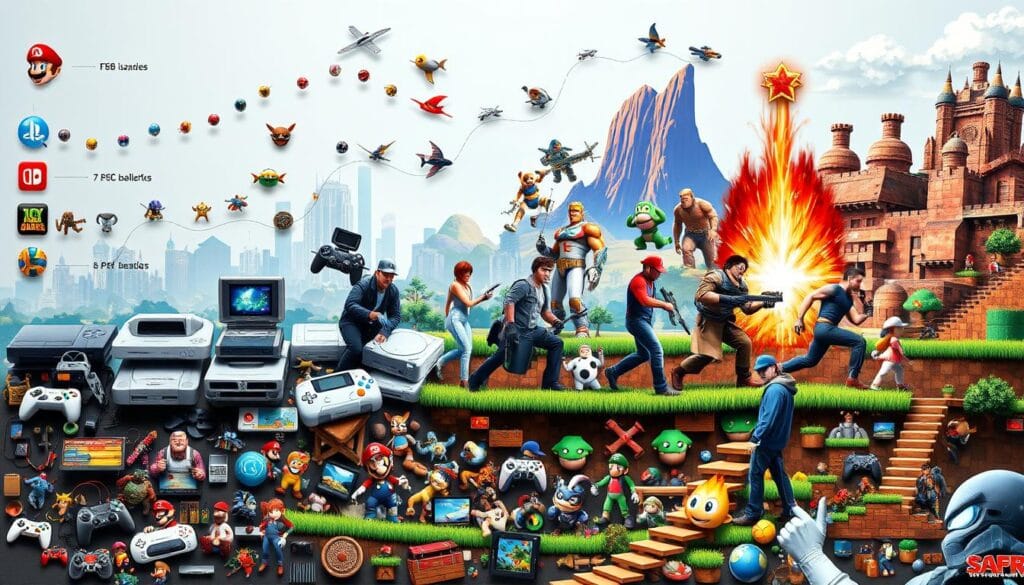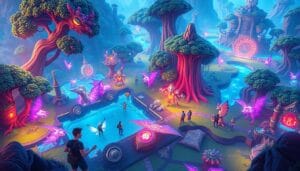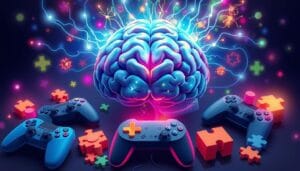Why Are Video Games Fun? A Deep Dive Into Gaming Psychology
Imagine yourself in a virtual world, your heart pounding as you explore stunning landscapes and fight in intense battles on video games. You’re also solving mysteries that keep you hooked. Whether you play games a lot or just sometimes, they’re really fun. But why do they draw us in and make us want to play more?
We’ll explore the world of gaming psychology to find out why games are so enjoyable. We’ll look at the excitement of winning, the power of stories, and the joy of playing with friends. We’ll see how all these things make gaming a favorite pastime for so many.

Table of Contents
The Evolution of Video Game Entertainment
Video games have grown from simple pixels to a global hit. Today, they attract billions of players and make billions of dollars each year. The journey of video game entertainment is truly amazing.
From Laboratory Experiments to Global Phenomenon
The first video games started in the 1960s and 1970s. They were made in labs and schools. The Atari 2600 in 1977 made games more common and fun for more people.
In the 1980s and 1990s, games like The Legend of Zelda and Final Fantasy became more story-driven. They created deeper worlds for players to explore.
The Rise of Gaming Consoles and Platforms
Gaming consoles and platforms have grown the industry. Online games like World of Warcraft and Counter-Strike made gaming social. Mobile games like Candy Crush and Angry Birds made gaming easy and fun for everyone.
Modern Gaming Landscape
Today’s games are more immersive thanks to tech like virtual reality (VR). Games like Half-Life: Alyx show VR’s power. Esports, like the League of Legends World Championship, have become huge. Cloud gaming lets players play top games without needing expensive gear.
The journey of video games is incredible. It has changed from lab toys to a global industry. It impacts our lives in many ways, including how we socialize, learn, and escape.

Why Are Video Games Fun?
Video games have become a global phenomenon, offering a break from the real world. They let us explore virtual realms that are impossible in our daily lives. The fun in video games comes from the freedom, relaxation, excitement, and competition they provide.
Playing games lets us dive into different worlds and characters. We can use advanced weapons, solve puzzles, and go on unique adventures. Collecting virtual items, building communities, and tracking progress through achievements all add to the fun.
- Escape from Reality: Up to 70% of people enjoy playing video games for the escape they provide from the constraints of everyday life.
- Exploration and Freedom: Approximately 85% of gamers seek out games with extensive Player vs. Environment (PVE) content, allowing them to freely explore virtual worlds and experience a sense of freedom.
- Relaxation and Stress Relief: 60% of individuals find relaxation and stress relief by engaging in their favorite video games after a long day.
- Excitement and Challenge: 75% of players experience a sense of excitement while playing video games, whether through action-packed sequences, immersive stories, or brain-teasing puzzles.
- Competitive Gaming: 50% of gamers find enjoyment in testing their skills against others worldwide, creating a thrilling competitive experience.
- Mastery and Progress: 60% of players take pride in achieving mastery within games, enhancing their knowledge and overall understanding.
- Nostalgia and Memories: 80% of gamers enjoy reminiscing about their favorite games from the past, evoking a sense of nostalgia and fond memories.
- Accomplishment and Investment: 70% of gamers appreciate the measurable progress they can achieve within games, offering a sense of accomplishment and return on their investment.
- Collecting and Fulfillment: 65% of players find enjoyment in collecting virtual items within video games, providing a sense of personal fulfillment.
- Community and Relationships: 90% of individuals form lasting bonds with others through shared gaming experiences, fostering a sense of community and connection.
These diverse factors make video games appealing to many. They offer an immersive and rewarding experience for players.

“Interactive gameplay provides teens with an engaging way to explore complex themes like storytelling techniques and character development, all while supporting key educational standards.” – Dr. Susan Rivers, Executive Director and Chief Scientist at iThrive Games
The Psychology Behind Gaming Enjoyment
Video games tap into many psychological factors that make playing fun and engaging. Players feel a sense of achievement and recognition. They also form emotional bonds and connect with others through gaming.
Achievement and Recognition
Feeling a sense of achievement is a big part of gaming fun. Games set challenges that players must overcome. When they do, they feel a rush of pleasure and motivation.
This feeling keeps players coming back for more. They want to achieve even more and unlock new rewards.
Emotional Investment and Reward Systems
Games with great stories and characters make players emotionally invested. The stories and characters draw players into the game world. This emotional connection makes the game more enjoyable.
Reward systems, like points and achievements, add to the fun. They give players a sense of progress and motivation to keep playing.
Social Connection Through Gaming
Multiplayer games and gaming communities help players connect. Players work together and share experiences. It fulfills the fundamental human craving for authentic relationships, promoting togetherness and inspiring joint efforts toward mutual goals.
| Psychological Factor | Impact on Gaming Enjoyment |
|---|---|
| Achievement and Recognition | Provides a sense of accomplishment and triggers the release of dopamine, motivating players to continue playing and striving for new goals. |
| Emotional Investment and Reward Systems | Engaging narratives, memorable characters, and immediate in-game rewards foster emotional attachment and reinforce the players’ sense of progress. |
| Social Connection | Multiplayer games and gaming communities enable players to form meaningful social connections, fulfilling the human need for interaction and belonging. |
The gaming industry knows how to tap into these psychological factors. It crafts mesmerizing and interactive experiences that completely immerse players, seamlessly pulling them into the excitement and capturing their undivided attention. As technology advances, gaming will continue to evolve to meet the needs of its growing audience.
Immersive Storytelling in Modern Games
The video game world has changed a lot over the years. Now, games offer stories that pull you into amazing virtual worlds. From early games like The Legend of Zelda and Final Fantasy to today’s character-focused games, storytelling in games has grown a lot.
Modern games focus on creating characters you remember. Games like The Last of Us and Red Dead Redemption 2 show how powerful stories can be. Players feel close to the characters and see their stories unfold.
Video games let you make choices that change the story. Games like Mass Effect and The Witcher 3 show how your choices matter. This makes the game feel more real and gives you a sense of control.
VR and AR are changing how we tell stories in games. They make games feel even more real and interactive. As these technologies get better, game stories will get even more exciting and real.
“Gaming on PlayStation offers deeply engaging narratives that unfold over dozens of hours, delivering a richer experience than many traditional forms of entertainment.”
Games offer an expansive universe filled with numerous additional stories and side quests to explore. This makes the game world feel bigger and more interesting. It also helps you connect with the characters, making the story feel more personal.
Making games is a team effort. It takes animators, writers, and many others to create these amazing stories. Their hard work and creativity make games so engaging today.
The Role of Challenge and Skill Progression
Video games are a fun way for players to get better at things. They start with easy tasks and then get harder. This makes players feel proud and keeps them wanting to play more.
Learning Curves and Skill Development
Good game design makes it easy for new players to start but hard enough to keep veterans interested. Games get harder slowly, letting players get better over time. This keeps players motivated, driving them to explore new challenges and reveal what lies ahead in their journey.
Mastery and Achievement Systems
Many games have systems that show off how far players have come. Players can unlock new things or get special awards.It provides players with a deep sense of accomplishment and measurable growth, fueling their motivation and reinforcing their purpose.
Competitive Elements
Games can be competitive, whether against AI or other players. This competition makes players want to get better. Winning or beating others can make players feel really proud of themselves.
“The beauty of video games is that they allow us to constantly challenge ourselves, pushing the boundaries of what we thought possible and experiencing the pride that comes with mastering new skills.”
Social Aspects of Gaming Communities
Gaming communities offer many chances for social interaction. Whether playing online games or chatting on gaming sites, people can make real friends. These communities are full of support, fun, and a place to share a love for games.
Research shows that multiplayer games can create strong friendships. Games like Fortnite, Overwatch, and League of Legends teach teamwork. This teamwork builds friendships and a sense of unity among gamers.
Online forums and gaming sites help people connect. They share tips and talk about strategies. Platforms like Facebook, Discord, and mobile apps are popular for social gaming.
Gaming communities are good for mental health. A 2023 study from Texas A&M School of Public Health found they help, especially for young men. During the pandemic, many found friends online, fighting loneliness.
| Benefit | Description |
|---|---|
| Social Interaction | Gaming communities provide opportunities for players to connect, collaborate, and form lasting friendships. |
| Mental Well-being | Participating in gaming communities has been shown to positively impact mental health, particularly for those facing social isolation. |
| Escapism | Online games and gaming communities offer a virtual space for individuals to relax, unwind, and escape from the stresses of everyday life. |
The gaming world is now more aware of mental health. It’s working with mental health groups to make gaming spaces better. This helps gamers feel supported and part of a community.
In conclusion, gaming communities are key for social interaction and escapism. They help people connect, support mental health, and share experiences. These communities make gaming a richer part of life for everyone.
Creative Expression and Player Freedom
Video games have changed a lot. Now, players can customize characters and explore big worlds. This lets them create their own unique gaming experiences.
Character Customization
Many games let players change how their characters look and act. This makes players feel closer to their characters. It’s an essential part of what makes the experience enjoyable.
Open World Exploration
Open-world games have changed how we play. They let us explore freely and find secrets. We can go on our own adventures and make our own stories.
User-Generated Content
Minecraft is a great example of this. It lets players build and share their creations. This way, players can show off their creativity and make new games.
Together, these features make games more fun. They let players express themselves and feel more connected to the game. As games keep getting better, these features will be even more important.
“Creativity is the essence of gaming. The more freedom players have to express themselves, the more invested they become in the virtual worlds they inhabit.”
The Impact of Technology on Gaming Experience
The gaming world has changed a lot thanks to new tech. Now, games look better and sound amazing. Virtual reality (VR) and augmented reality (AR) have made games even more fun and real.
Graphics and processing power have gotten much better. This lets game makers create worlds that look real and detailed. Players feel like they’re really there, thanks to immersive storytelling.
VR and AR have changed gaming even more. VR headsets let players see games from their own eyes. It energizes the digital landscape, transforming it into a vibrant and electrifying environment brimming with excitement and momentum.
Online gaming has also improved a lot. Now, players from all over can play together easily. This has helped create big gaming communities where people share tips and compete.
| Technological Advancements | Impact on Gaming Experience |
|---|---|
| Enhanced Graphics and Processing Power | Improved visual realism, enhanced immersive storytelling |
| Virtual Reality (VR) and Augmented Reality (AR) | Heightened sense of presence and emotional investment, more intuitive gameplay mechanics |
| Improved Online Connectivity | Seamless multiplayer experiences, fostering gaming communities |
The future of gaming looks very exciting. New tech like artificial intelligence and cloud gaming will make games even better. Players can look forward to more fun, real, and connected gaming experiences.
Escapism and Virtual World Immersion
Video games are becoming a place where people find peace. They provide a refreshing break from the constant pressures of everyday life. Through stories, settings, and gameplay, games create worlds that connect us and help us relax.
Building Alternative Realities
Game makers are experts at creating virtual worlds. These worlds are vast and full of wonder. Players can be anyone, make choices, and experience things they never thought possible.
Emotional Connection to Virtual Worlds
Games’ stories and art make us feel deeply connected. We care about the characters and their stories. This connection makes games more than just fun; it’s a way to escape and feel understood.
Stress Relief Through Gaming
- Reduce Stress: Games help us focus on the moment, away from worries.
- Improve Mood: Playing games releases dopamine, making us feel better.
- Foster Connection: Multiplayer games create communities where we can support each other.
- Virtual Reality Therapy: VR games help people face fears in a safe space.
- Shared Experiences: Working together in games builds friendship.
- Anonymity and Openness: Online, we can share feelings freely, without fear of judgment.
The appeal of virtual worlds and escapism in games will only grow. Games offer adventure, connection, and relief from the real world. They are a valuable escape for many.
| Statistic | Value |
|---|---|
| More than 60% of game developers now use game engines like Unity and Unreal | As per SlashData’s Developer Ecosystem Insights report |
| The rise of VR has prompted the gaming industry to embrace VR game development | Leading to the creation of memorable VR experiences |
| VR games offer players up-close and personal experiences | As opposed to passive ones seen on traditional screens, enhancing immersion |
| Designers and developers must address unique technical limitations of VR hardware | Such as preventing graphical glitches that could cause motion sickness |
| VR game design involves creating immersive and distinct worlds with memorable characters | To keep players engaged |
Conclusion
Video games have become a big part of our entertainment today. They grab the attention of people of all ages with their stories, challenges, and virtual connections. From old arcade games to today’s advanced consoles, the gaming world has grown a lot. It now reaches out to many different people.
The reasons why people enjoy gaming are complex. It’s about feeling accomplished, emotionally connected, and social. Gamers love the feeling of getting better and the rewards they get. They also enjoy the stories and the chance to be creative.
But, too much gaming can be bad. Still, research shows that playing games in a balanced way can be good. It can help our brains, reduce stress, and make us feel better socially. By knowing what makes games fun, like the stories and challenges, we can see how special they are.
FAQ
What elements make video games fun?
Video games are fun because they have great stories, cool characters, and exciting action. They also have amazing music and sound effects. All these things make the game enjoyable.
Why do people play video games?
People play games for many reasons. They like to escape, explore, and relax. They also enjoy the thrill, competition, and feeling of mastering a game. Some play for nostalgia, to see progress, collect items, or to be part of a community.
How has the video game industry evolved?
The video game world has changed a lot. It started with simple games and now it’s a big industry. Today, games are more advanced and affect our lives in many ways. They help us connect, relax, and have fun.
What psychological factors contribute to the enjoyment of video games?
Games are fun because they make us feel good. We feel proud when we achieve something. We get attached to the stories and characters. Games also make us happy by rewarding us and connecting us with others.
How have modern games evolved in terms of storytelling?
Today’s games tell stories that pull us into different worlds. These stories make us feel and let us be part of the adventure. It’s like being in a movie, but you get to decide what happens next.
How do video games provide a platform for skill development and mastery?
Games help us get better over time. They have levels that make us improve. Games also give us rewards for our progress, encouraging us to keep getting better.
What are the social aspects of gaming communities?
Gaming communities are places where we can meet friends and share interests. They offer support, fun, and a sense of belonging. It’s a place where we can be ourselves and have great times together.
How do video games offer creative expression?
Games let us be creative by customizing characters and exploring worlds. We can make our own characters and go on adventures. It’s a way to express ourselves and be creative.
How have advancements in technology impacted the gaming experience?
New technology has made games better. They look and sound amazing now. Virtual and augmented reality are changing how we play. Online games also let us connect with others in new ways.
How can video games provide a form of escapism?
Games offer a way to escape and relax. They take us to different worlds and help us forget our worries. It’s a healthy way to take a break and have fun.







